- Home
- Alternative Treatments
- Daith Piercing for Migraines
COMPLETE MAGNESIUM SUPPORT
My Top Choice - Magnesium Breakthrough - The ONLY supplement with all 7 essential magnesium types in one formula. Most only have 1-2 types, leaving you deficient.
Daith Piercing for Migraines: Can It Really Stop Attacks?
I’ll be upfront with you, I’m pretty skeptical about daith piercing for migraines and the supposed benefits.
Daith piercing, a type of cartilage piercing through the innermost fold of the ear, has gained attention as a potential alternative treatment for migraine relief. For those who suffer from frequent migraine attacks, this option may seem like a quick fix, but does it actually work? While anecdotal reports suggest that daith piercings might relieve some pain, the scientific evidence remains inconclusive.
Let's explore what’s known so far about daith piercings, survey results, pros and cons, and expert insights to help you make an informed decision.
My #1 Choice in Magnesium Supplements
Contents
- The Science Behind Daith Piercing and Migraine Relief
- Pros and Cons of Daith Piercing for Migraine Relief
- Survey Results: Real People’s Experiences with Daith Piercing
- Expert Insights: Medical vs. Holistic Views on Daith Piercing for Migraines
- Practical Tips: Safety, Risks, and Aftercare for Daith Piercing
- Alternatives to Daith Piercing for Migraines
- Conclusion: Is Daith Piercing Right for You?
If you're a regular here, you'll know I lean more towards proven, evidence-based treatments. So with daith piercing for migraine relief, aside from some anecdotal evidence, there are no solid numbers or large-scale studies (or a double-blind placebo-controlled clinical trial) that support the claim that daith piercing cures migraine.
And don’t be fooled into thinking it’s a kind of acupuncture (I studied traditional Chinese medicine). It isn’t. Out of the 1,120 points in the ears, daith piercing doesn’t coincide with a single point that’s commonly used to treat migraine with acupuncture. (See large image.)
The Science Behind Daith Piercing and Migraine Relief
While daith piercings have gained popularity, the connection between ear cartilage and migraine relief is not fully understood. Some proponents believe that daith piercings could work by stimulating the Vagus nerve, which plays a role in managing pain and stress. Others compare it to auricular acupuncture, a form of acupuncture that targets specific points in the ear, although traditional acupuncture does not use the daith point for treating migraines.
What the Research Says
So far, there is no large-scale clinical trial that supports daith piercing as an effective migraine treatment. A small survey from MigrainePal (mentioned above) found that about 35% of participants reported a decrease in migraine severity or frequency. However, medical experts emphasize that this is not definitive proof, and the effects could be largely due to the placebo effect. This lack of scientific backing means that anyone considering a daith piercing should weigh the benefits with caution.
Pros and Cons of Daith Piercing for Migraine Relief
Based on everything I’ve read (most of which was generated from one single social media source!), here are the pros and cons of daith piercing for migraines - from my point of view:
Pros
- Affordable Option: Compared to other treatments, daith piercing is generally inexpensive, with most piercings costing between $30 and $60.
- Non-Invasive: While daith piercings are considered minor, they are still less invasive than some migraine treatments, such as nerve blocks.
- Aesthetic Appeal: Some people appreciate the look of the piercing and consider it a win-win if it also helps reduce migraine frequency or intensity.
- It might help (BIG PRO!)
Cons
- Lack of Targeting Migraine-Specific Points: Traditional acupuncturists often note that daith piercings do not target known pressure points used in migraine acupuncture.
- Risk of Infection: As with any piercing, there’s a risk of infection, especially if proper aftercare is not followed. Cartilage piercings, in particular, are more prone to complications and take longer to heal.
- Healing Time: A daith piercing can take six months or more to heal fully, during which time the risk of infection and pain can persist.
- Mixed Results: Survey results and testimonials show mixed outcomes, meaning there is no guarantee of relief.
- It might not work, or it might make your migraines worse.
Survey Results: Real People’s Experiences with Daith Piercing
Recent surveys and anecdotal reports show a variety of outcomes. While some people have found relief, others report no change or worsening symptoms. Here’s a breakdown of the MigrainePal survey results on daith piercing’s impact on migraine severity and frequency (P.S. If you're on your phone, turn this sideways to see the chart properly):
Results
Increased Pain + Symptoms
No Change
Reduced Attacks
No Further Attacks
Severity Improvement
9%
24%
49%
18%
Frequency Improvement
7%
28%
44%
20%
For those considering a daith piercing, these results highlight the importance of realistic expectations. Some experts believe the improvement reported may be due to a placebo effect or psychological factors, so it’s wise to consider it only as a complementary treatment.
Migraine frequency was also recorded, with:
- 5% seeing an increase in attacks
- 31% reducing attacks by half, or more than half
- 18% seeing a full remission
A standout point is that 18-20% eliminated their attacks and 44-49% reduced them.
This study does show that daith piercing for migraines may break the cycle initially. And it appears to have worked for a good proportion of the participants, and a recent study proved that it does appear to have long-term, sustainable benefits. I'd still err on the side of caution and implement a more robust, clinically proven treatment program for your long-term migraine management plan.
The long-term statistics after 2 years decline. So, the more recent the piercing, the better the results. This is important.
Another larger study was run by the London Migraine Clinic under Dr. Chris Blatchley. Their findings were that the effects of daith piercing appeared to be quite resilient in that 60% after one year had no drop-off effect. They did find that it did not work in approximately 15% of migraine patients. Here are their details - Migraine Piercing London. [1]
My #1 Choice in Magnesium Supplements
Expert Insights: Medical vs. Holistic Views on Daith Piercing for Migraines
Most neurologists and migraine specialists are cautious about recommending daith piercings due to the lack of scientific evidence. However, holistic practitioners, including some acupuncturists, view daith piercings as a form of alternative therapy. Here’s a closer look at both perspectives:
- Medical Experts: Neurologists generally do not support daith piercing as a migraine treatment, recommending more established options like medications, lifestyle changes, or nerve stimulation techniques.
- Holistic Practitioners: Some holistic practitioners and acupuncturists believe that daith piercing might provide temporary relief for those interested in natural therapies. While not a formal acupuncture point for migraine treatment, they consider it a type of auriculotherapy.
According to Live Oak Acupuncture Center
“Clinical experience suggests that body piercings offer temporary (1-2 weeks) therapeutic benefit at best. They definitely do not represent a long term cure for any condition, including migraines.”
This is directly from a professional acupuncturist. If you read the comments, you will see a great debate.
Another very small study (40 people) cited in this article by Battlefield Acupuncture, showed a significant reduction in headache days. It also highlights that there is a more specific field of study required outside of 'mainstream' acupuncture called auriculotherapy, and that this kind of precise piercing expertise is required.
Practical Tips: Safety, Risks, and Aftercare for Daith Piercing
If you’re considering a daith piercing, it’s essential to prioritize safety and understand aftercare requirements. Here are some practical tips to follow:
- Choose a Reputable Piercer: Look for a professional piercing studio with high ratings and a clean environment. A skilled piercer will reduce the risk of complications.
- Follow Proper Aftercare: Clean the piercing twice daily with a saline solution to minimize infection risks. Avoid touching or twisting the jewelry, which can slow the healing process.
- Expect a Long Healing Time: Cartilage piercings can take anywhere from 6–9 months to heal completely. During this time, keep the area clean, avoid swimming in public pools, and minimize exposure to bacteria.
- Consult Your Doctor: Speak to your healthcare provider before getting the piercing, especially if you have a history of ear infections or immune system concerns.
My #1 Choice in Magnesium Supplements
Alternatives to Daith Piercing for Migraines
If you’re looking for migraine treatments beyond daith piercing, several alternatives are available, many of which are backed by more research. Consider these options:
- Auricular Therapy: This entails stimulating key points in the outer ear - all of which correspond to body parts and functions - with seeds or needles, just like acupuncture. This treats an array of ailments, migraines being one of them.
- Acupuncture for Migraine Relief: Traditional acupuncture, performed by a licensed practitioner, is one of the most widely studied alternative treatments for migraine.
- Lifestyle Adjustments: Identifying and managing triggers like stress, diet, and sleep can be one of the most effective ways to reduce migraine headaches.
- Medication: Medications, including targeted prescription abortive and preventives, remain the most effective, research-supported treatment for migraine relief.
These alternatives may offer a more reliable solution than daith piercing and can be part of a comprehensive migraine management plan.
Conclusion: Is Daith Piercing Right for You?
While daith piercing may hold appeal as a potential migraine remedy, it’s not a guaranteed solution. If you’re intrigued, do your research, consult reputable piercers, and prioritize safety.
Remember, the evidence is largely anecdotal, and most experts recommend established treatments for managing migraines. However, if you’re looking for a complementary approach and appreciate the aesthetic of a daith piercing, it may be worth exploring with realistic expectations.
Have You Tried Daith Piercing for Migraines?
If so, I’d love to hear how the experience was for you. Did you get good results? Or did it make your migraines worse?
Stay in touch. Download 5 prevention tools you can use right now by >> joining the mailing list.
You might like to read this study...
Daith Piercing in a Case of Chronic Migraine: A Possible Vagal Modulation.
Cascio Rizzo A, Paolucci M, Altavilla R, Brunelli N, Assenza F, Altamura C, Vernieri F. Front Neurol. 2017 Nov 27;8:624. doi: 10.3389/fneur.2017.00624.
WANT MORE TIPS? Subscribe to my newsletter and follow along on Facebook and Pinterest for all of the latest updates.
ALTERNATIVE MIGRAINE TREATMENTS Related Articles
How to be more MIGRAINE SAVVY right now...
References:
1. Migraine Pal (2016) Daith Piercing Evidence for Migraine. Available [online] at: https://migrainepal.com/daith-piercing-evidence-for-migraine/
2. John Howard, L.Ac., Dipl. Ac. and Eric Serejski, L.Ac., Dipl. Ac, Ch (2019) The Daith piercing as a possible layman’s treatment option for those who suffer from headaches and migraine headaches. Available [online] at: https://www.battlefieldacupuncture.net/daithpiercing/
3. Horner-Warren, K. (2015) No, Getting Your Ear Pierced Won't Cure Your Migraines. Available [online] at: https://www.liveoakacupuncture.com/can-getting-your-ear-pierced-really-cure-migraine-headaches/
4. Migraine Piercing London (2019) Available [online] at: https://daith.co.uk/

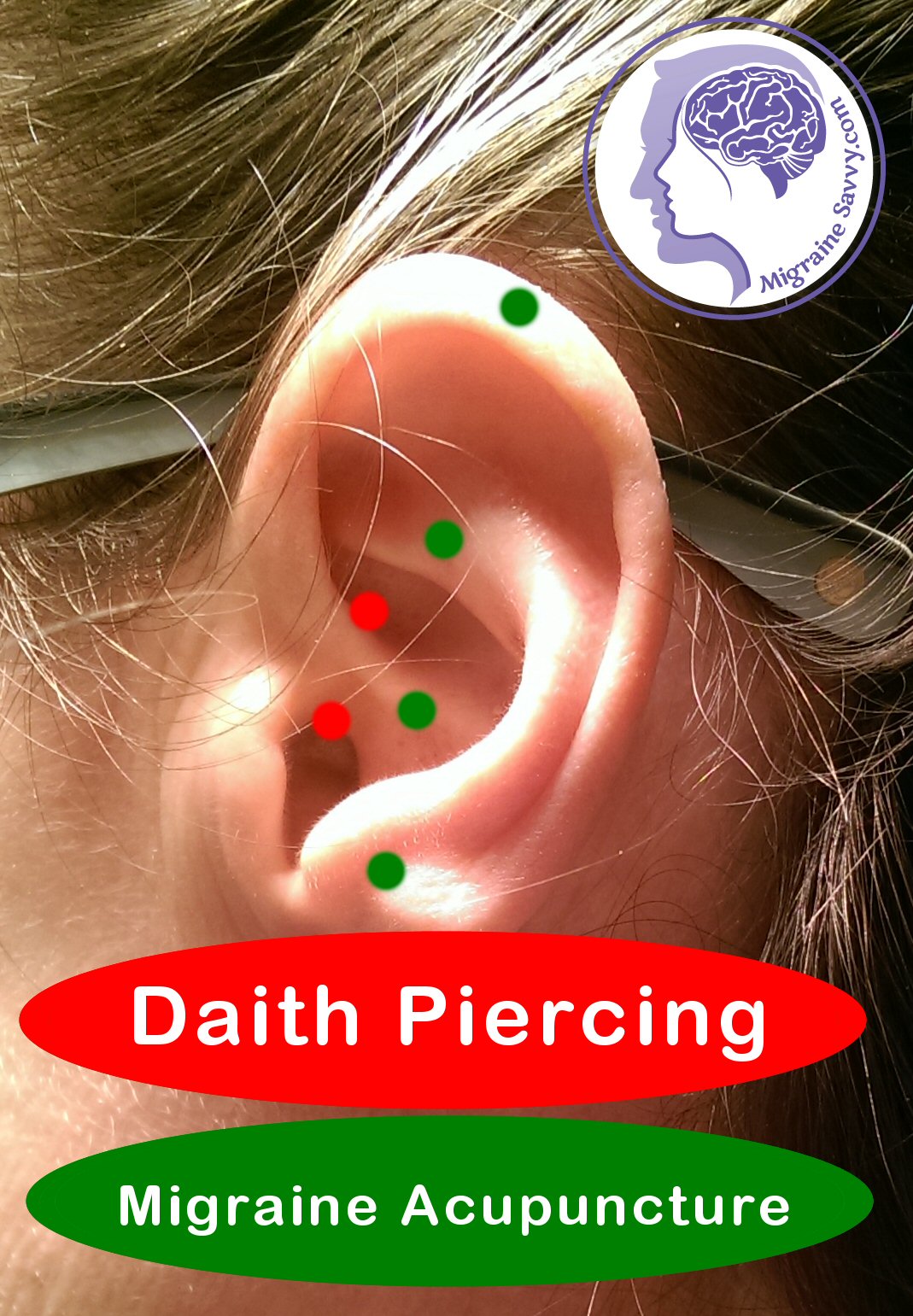

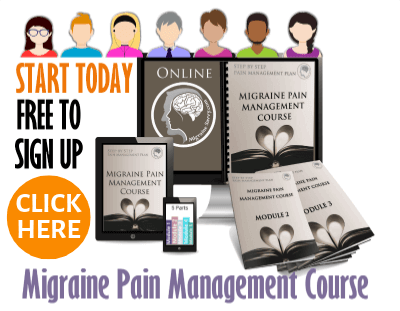
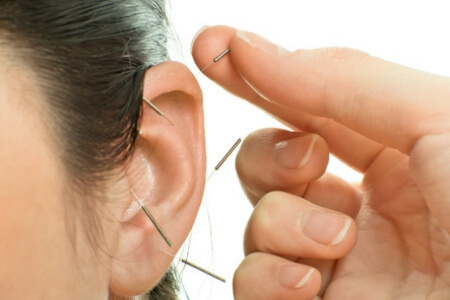

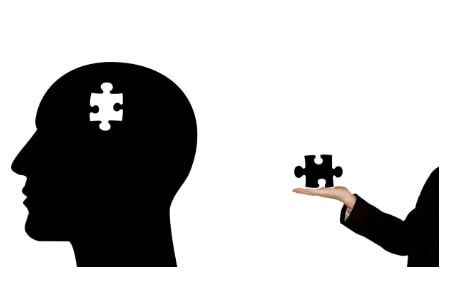
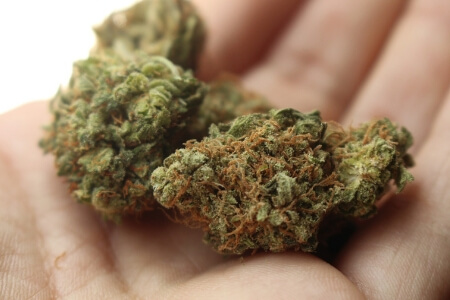


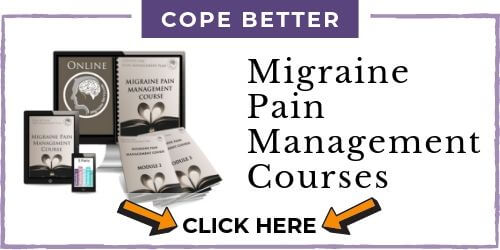
I want to walk you through this a little more. There's a little history you may not know.
Surprisingly, daith piercing for migraines became a ‘thing’ when a mention from one person on social media went viral. For a long time after that, every article that was written about daith piercing was based on that one original social media source. Hardly a very comprehensive piece of research, and it didn’t inspire me with confidence in the validity of the claims.
Years ago, the folks at Migraine Pal did a small, informal study of 1,107 participants that produced results that suggested that daith piercing for migraines may have the potential to produce beneficial effects in the early months after the initial piercing.
The results after 2.5 years were that half of the 1,170 participants experienced some kind of improvement. More specifically for migraine severity, of that:
Impressive results, imo!